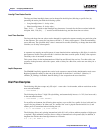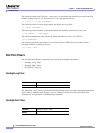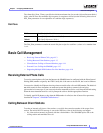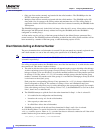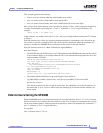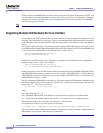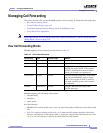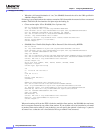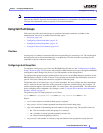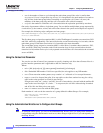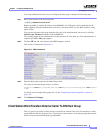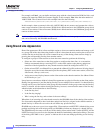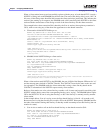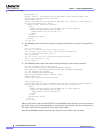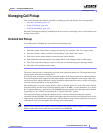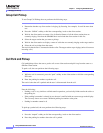
4-19
Linksys SPA9000 Administrator Guide
Document Version 3.01
Chapter 4 Configuring SPA9000 Features
Managing Call Forwarding
Note You can also specify a final forwarding destination if no station answers the incoming call and the total
hunt time has expired. Typically, the forwarding destination is a voicemailbox. See the description of the
<Contact List> parameter on how to specify a call forward destination.
Using Call Hunt Groups
This section describes how hunt groups are configured using the parameters available on the
administration web server. It includes the following topics:
• Overview, page 4-19
• Configuring a Hunt Group Rule, page 4-19
• Configuring a Hunt Group Rule, page 4-19
• Using the Contact List Parameter, page 4-20
Overview
A hunt group is a number of extensions that share responsibility for answering a call. The extensions in
the hunt group can be alerted simultaneously or sequentially. The first extension to pick up the call
establishes a private connection to the caller.
Configuring a Hunt Group Rule
To configure a hunt group, you can use the SPA9000 Setup Wizard (see the “Configuring a Call Hunt
Group” section on page 4-6). However, after using the administration web server to change the SPA9000
configuration, these changes may be lost if you subsequently use the Setup Wizard.
To configure hunt groups using the administration web server, use the <Hunt Groups> parameter on the
PBX Parameters section. Use the <Contact List> parameter on the Subscriber Information section of a
specific Line tab to identify the extensions assigned to each hunt group.
The default value of <Contact List> is aa, for Auto-Attendant. You can configure the Auto-Attendant to
notify a caller on the associated line of the extensions assigned to each hunt group. For example, “To
contact technical support, dial extension 6001. To contact sales, dial extension 6002.” For information
about configuring Auto-Attendant voice prompts, see the
“Using the IVR to Record Auto-Attendant
Prompts” section on page 5-2.
The general syntax for a hunt group rule is as follows:
ext-in:name=hunt-groupname,hunt-list,hunt=algo;ring-interval;max,cfwd=ext-fwd
Where:
• ext-in is the extension to which the hunt group is assigned.
• hunt-group is a list of comma separated extensions that form the hunt group.
• algo is the method of determining the next number in the group to ring. The possible values are:
• ne—The next number in the hunt group list is selected.
• ra—A number is selected pseudo-randomly from the list.
• re—Starts from the beginning of the list.
• ring-interval is the number of seconds to ring one number in the group before trying the next.



